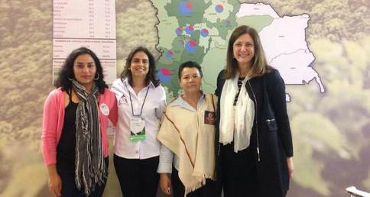- With representatives from 30 countries, the event co-hosted by the Colombian Coffee Growers Federation is deemed a success
Bogotá, October 16, 2015 (FNC Press Office) – With representatives from 30 countries, the 8th International Women’s Coffee Alliance (IWCA) Convention successfully came to an end this Friday, within the framework of the 8th International Specialty Coffee Expo ExpoEspeciales Café de Colombia 2015 (October 15-18).
“This Convention was a big success,” said Grace Mena, the Convention’s president from Costa Rica. “We want to continue working closely with the Colombia chapter because the work done here is significant and the role of the Colombian Coffee Growers Federation (FNC) is crucial.”
“The message from Roberto Vélez, the FNC CEO, on importance of women in coffee production is really helpful because there were representatives from other countries and institutions; this helps us empower women,” Mena added.
Relevant industry issues were addressed with a gender approach by key international speakers including Robério Oliveira, executive director of the International Coffee Organization (ICO); Ric Rhinehart, executive director of the Specialty Coffee Association of America (SCAA), and Aicha Pouye, director of International Businesses and Relations of the International Trade Centre (ITC), among others.
The topics discussed at the event help strengthen the role of women in the global coffee industry from bean to cup: challenges and opportunities for coffee produced by women in Asia, Europe and America; global industry outlooks; impacts of coffee produced by women on their communities’ development; and women’s role in the value chain.
Growing demand for specialty coffee and new preparations in traditional markets such as the USA, Canada, Europe and Japan, and consumption growth in producer countries (such as Colombia) and in emerging countries, such as China, Russia and South Korea, are good news to all producers.
“I would highlight the basic need to build a global coffee farming model that can actually develop producer regions,” said Ana María Lleras, the FNC coordinator of the Convention.
“We understood the need for sustainable human development, something we have been working on. Production is largely in the hands of small producers. Women are strategic partners, and they are now earning a livelihood in coffee farming, but they want more: they want support, programs, education, empowerment … all the possibilities that the industry can offer them,” she added.
Another issue addressed was sustainability from a broader perspective, without limiting it to certification and/or verification standards, but extending it to producers’ performance instead of simply complying with some criteria.

Gender equity as a key factor for sustainability
Gender equity, beyond traditional narratives, is a key factor for the sustainability of coffee farming.
This Friday, Lleras participated in a gender panel discussion with Kimberly Easson, strategic alliances director of the Coffee Quality Institute (CQI); Penelope Hurndell, senior executive of the International Trade Center (ITC), and Catherine Murphy, country director of the Africa Tanzania Coffee ONG.
Lleras noted that, since its creation 9 years ago, the FNC’s IWCA chapter has been working on changing paradigms and myths. “These myths are hurdles, and sustainability challenges us to face them with coherent actions by different groups, i.e., producers, cooperatives, associations, committees, customers, consumers, etc.,” she said.
“Our FNC gender equity program does not only focus on goals (equal opportunities), but also on translating them into actions that contribute to the country’s sustainable development,” Lleras added.
Easson presented the results of a survey that reviewed existing literature and workshops on gender equity in the coffee industry of Cauca, Colombia, Uganda, Nicaragua, and Indonesia: women do most of work and re-invest 90% of the income they receive in their homes, while men only re-invest 40%, according to the survey.
The CQI member recommended increasing women’s participation in training, raising industry awareness of gender; balancing leadership positions, and supporting decision-making at home and farm levels because women are very responsible regarding coffee.
“Gender equity is the basis for a sustainable coffee industry, it’s strategic for everything we want to achieve: quality coffee, reliable supply, healthy coffee-growing families and communities, and a vibrant industry for future generations,” Easson stressed.
Hurndell addressed the importance of ICTs in African countries and how to make women’s work easier with email addresses, a bank account, access to computers, Internet, a small office, basic resources, sponsors and partners.
Murphy explained her organization’s work (through ITCs) in Tanzania, a country where coffee areas are very scattered, with cultural differences that pose challenges to coordination of women in the coffee sector.
Mapping and characterizing coffee areas and communities, and searching for public-private partnerships are some actions that help coordinate efforts and add value to the coffee chain, she said.

